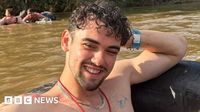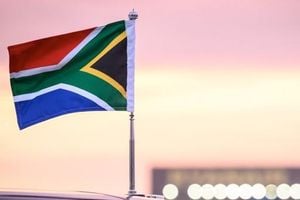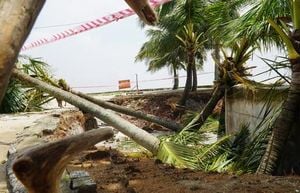When Calum Macdonald set off on his backpacking adventure through Southeast Asia last November, he never imagined his travels would end in tragedy and lifelong disability. The 23-year-old Briton, like so many young travelers, was lured by the promise of cheap drinks and camaraderie at the Nana Backpacker Hostel in Vang Vieng, Laos—a popular stop on the Southeast Asian circuit. But what should have been a night of fun turned into a nightmare that would claim six lives and leave Calum permanently blind.
According to BBC News, the hostel was offering free shots of vodka and whiskey to guests. Calum, mixing the spirits with soft drinks, thought little of it. The next day, as he and his friends made their way toward the Vietnamese border, he began to feel strange. "I remember having this sort of kaleidoscopic, blinding light in my eyes and to the point at which I couldn't see anything," Calum told BBC Breakfast. At first, the group brushed off his symptoms as food poisoning or perhaps a sensitivity to light. But the gravity of Calum’s condition became clear only when they reached a hotel in Vietnam. "We were sitting in the hotel room, my friends and I, and I said to them: 'Why are we sitting in the dark? Someone should turn a light on.' The lights were already on," he recalled.
The culprit: methanol, a toxic alcohol often found in cleaning products and fuel, but sometimes present—either accidentally or intentionally—in bootleg spirits across Southeast Asia. As reported by Metro and the Daily Mail, methanol can be created during improper fermentation or distillation, or even added deliberately to increase the alcohol content of cheap spirits. The substance is colorless and tasteless, making it nearly impossible to detect in a drink. Consuming even small amounts can be fatal or cause permanent damage; as little as 15 to 30 milliliters can kill, while survivors may be left with lifelong disabilities such as blindness.
Calum’s story is not unique. Six other tourists who drank at the Nana Backpacker Hostel that night lost their lives, including Simone White, a 28-year-old British lawyer, two Danish women aged 20 and 21, two 19-year-old Australians, and a 57-year-old American. According to the BBC, Simone had sent her mother a text message the day before, saying it was "the best holiday she’d ever been on." But after sharing six shots with her friend Bethany Clarke at the hostel bar, Simone’s health rapidly deteriorated. She was admitted to hospital in a coma and, despite emergency brain surgery, died days later. "It's very hard to come to terms with what's happened," her mother Sue told the BBC. "Nothing is going to bring Simone back."
Other tragic cases abound. The BBC highlighted the story of Kirsty McKie, who died in Bali in 2022 after drinking contaminated alcohol at home with a friend, and Cheznye Emmons, who died on Sumatra after consuming gin containing 66,000 times the legal limit for methanol. These stories underscore a grim reality: methanol poisoning is a recurring threat in parts of Southeast Asia, with hundreds poisoned each year, according to Doctors Without Borders (MSF).
The symptoms of methanol poisoning can be insidious. Early signs—dizziness, headaches, nausea—are easily mistaken for a typical hangover. But within 12 to 48 hours, more severe effects set in: seizures, confusion, blurry vision, and eventually, blindness or coma. The toxic alcohol attacks the optic nerve and can cause metabolic acidosis, organ failure, and death. Calum described his own ordeal crossing into Vietnam: "The point at which I really started to notice some strange side effects was we briefly got off the bus to cross the border into Vietnam ... my entire vision was engulfed in this blinding white light. I just thought, you know, this is very strange. I couldn't actually see where I was walking."
For those lucky enough to reach medical care in time, treatment is possible but time-sensitive. As reported by Metro, hospitals can administer the antidote fomepizole, which blocks the body from metabolizing methanol into its more toxic byproducts, or use dialysis to clean the blood. In some cases, ethanol—the same alcohol found in safe drinks—is administered in a controlled hospital setting to outcompete methanol for metabolism. But these treatments are only effective if given within 10 to 30 hours after ingestion, and access to such care is often limited in developing countries.
In the aftermath of the Laos tragedy, Calum has become an advocate, working with the families of other British victims to demand clearer warnings from the UK Foreign Office and better education in schools. "I think I definitely feel a sense of responsibility as someone who's been lucky enough to survive this, to try and get the message out. Because I know certainly, if I'd known about it, I wouldn't be in this situation," Calum told the Daily Mail. Bethany Clarke, Simone White’s travel companion, has spearheaded a petition to have methanol awareness included in British school curricula, arguing that young travelers need to be informed of the risks before embarking on gap years or backpacking trips. Her petition has already surpassed 12,000 signatures, with the hope that it will be debated in Parliament if it reaches 100,000.
The Foreign Office, for its part, acknowledges the danger. In a statement to the BBC, it described methanol poisoning and counterfeit alcohol as "a serious problem in some parts of the world" and said it was working with local authorities and the travel industry to raise awareness through travel advice and campaigns. Yet victims’ families argue that more direct, hard-hitting warnings are needed, especially for young people planning to travel in high-risk regions.
So what can travelers do to protect themselves? Experts and survivors alike offer practical advice: refuse drinks from unlabelled bottles or containers, avoid free shots or drinks you didn’t see poured, and buy spirits only from licensed shops. Even then, caution is warranted—some unscrupulous venues refill branded bottles with dangerous substitutes. As Calum put it, "There are lots of lovely beers in south-east Asia, which I'm sure people would really enjoy." Beer and ready-made beverages are generally safer options than spirits in regions where methanol poisoning is a risk.
Meanwhile, the Nana Backpacker Hostel has reportedly reopened under a new name and branding. Police in Laos have detained several people in connection with the deaths, but the broader issue of bootleg alcohol remains unresolved. For Calum and the families of those lost, the hope is that by sharing their stories and campaigning for change, fewer travelers will have to endure such devastating consequences. "Given that I was lucky enough to survive, I have a bit of a responsibility to try and prevent the same thing from happening to other people," Calum reflected. His message, and the lessons from this tragedy, are a sobering reminder for all who venture abroad in search of adventure.






